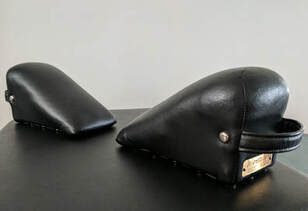 Using Sacro Occipital Technique, wedge-shaped blocks are placed under the pelvis to correct imbalances in the sacroiliac joint and lumbar spine. This gentle low force technique can have far reaching effects and has been shown to change brainwave patterns. Using Sacro Occipital Technique, wedge-shaped blocks are placed under the pelvis to correct imbalances in the sacroiliac joint and lumbar spine. This gentle low force technique can have far reaching effects and has been shown to change brainwave patterns. For better or worse, going to a chiropractor is synonymous with a "cracking" or "popping" noise. As a chiropractor, when I meet people, they often ask "hey doc, can you crack my back?" On the other hand, a large number of patients contact me because they don't want someone to crack their back. The good news for those who don't want their back cracked is that it never has to happen at my office if the patient doesn't want it. But since this is the topic of this blog post, here is just a little more info on what is really going on. Simply put, the cracking noise associated with chiropractic adjustments is a gas exchange in the joints of the body. Cracking your knuckles is a gas exchange in a joint. It is no different in your spine. When a joint is extended beyond its end range of motion, or paraphysiological space, there is often a noise. The cracking comes from a type of adjustment called high velocity low amplitude (HVLA). Traditional chiropractic adjustments often elicit this noise because they bring joints into the paraphysiological space, and a gas exchange occurs. But does that noise mean you have fixed anything? The answer is...sometimes. Having been involved in numerous research studies, I attend research conferences, where I have learned from the more recent research that the noise really has very little to do with the neurology of what a chiropractor is trying to do. For me, chiropractic isn't about making noise, it's about changing neurology. Often, the chiropractic adjustment affecting neurology will make that noise. People begin to associate the crack with feeling better. That is called paired learning, and both patients and chiropractors themselves think that noise MUST occur for the adjustment to be a success. I find that simply isn't true, and more recent research is confirming my findings. I am trained in a variety of techniques that don't involve popping and cracking, including Sacro Occipital Technique (SOT), Activator, Thompson, Dynamic Spinal Analysis, Advanced Chiropractic Techniques and Cox flexion distraction. A certain segment of my patient population seeks me out because they don't like the noise produced by traditional methods of chiropractic. Some patients have joint hypermobility - the joints move too much. For those patients, popping and cracking the joint will make it more hypermobile. There may be temporary relief, but the problem isn't being solved, and it could be making them worse. This is especially true of the sacroiliac joint when there is hypermobility in that joint. I find that a lot in my practice. Also there are disorders like Ehlers-Danlos Syndrome (EDS), Marfan syndrome and other conditions where people have weak ligaments which shouldn't be stretched further. With all that being said, in my office corrections are made based on neurological indicators based on analysis. Adjustments can be with or without the noise. A lot of the time I find the noise is unnecessary. So, if you don't like the crack, no problem! Call my office in Palm Harbor, FL to schedule an appointment.
0 Comments
|
AuthorI'm a Chiropractic Physician, Psychotherapist and researcher. I'm interested in helping people live their lives to their full potential. That could be simply without pain. Or it could be without more complicated physical or mental health problems. Or it could be getting help in making changes in their life so that they can achieve their dreams. Archives
June 2023
Categories |
 RSS Feed
RSS Feed